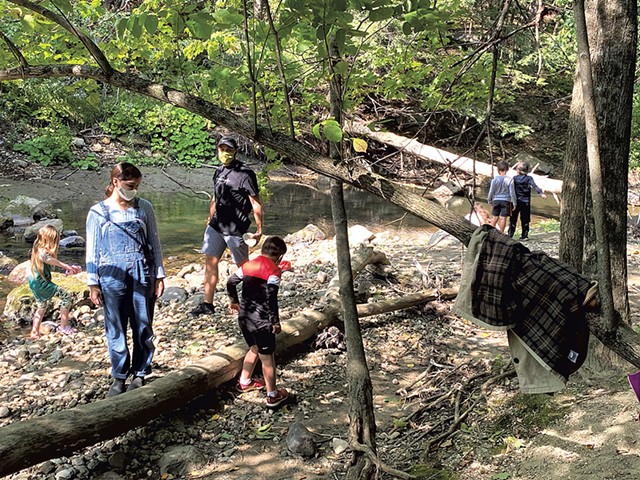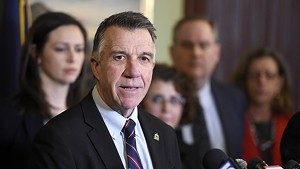
- Courtesy
- Students playing by Lewis Creek at the Common Ground Center in Starksboro
By mid-September, camp is usually a distant memory for kids. But last week at Common Ground Center in Starksboro, school-age children played in Lewis Creek with summertime abandon, despite the unmistakable chill in the air.
A young girl, wearing rainbow-hued sneakers and a Dr. Seuss-themed mask, lugged a flat rock from the water to the creek's sandy bank, where her classmates were busy making a fairy house. "Guys, I got a big rock for the roof," she said, before handing it off with the efficiency of a construction site manager.
In normal years, the Common Ground Center — 700 acres of fields and forests, dotted with a handful of rustic outbuildings, situated between the Hogback and Green mountains — is an idyllic setting for summer camps and weddings. But this fall, the site is hosting two "learning hubs" — the state's way to provide childcare for students when they can't be at school.
It's been a little more than a month since Gov. Phil Scott announced the creation of such programs, which are intended to relieve the pressure that school districts' hybrid fall schedules are putting on working parents. Using $6.9 million from the state, officials have gotten 31 hubs up and running at 83 sites, able to serve 4,800 children in grades kindergarten through six.
"We know we need more childcare capacity, and we need it quickly," Scott said in August, noting the challenge that inconsistent school schedules would pose to families.
The hurried effort to set up the sites with enough staff, programming and space has been a challenge, said Miranda Gray, who is overseeing the initiative for the state as its school-age hub project manager. But aside from a few hiccups, the programs have gotten off to a good start and have been an important addition during an unprecedented school year, officials and parents say.
"This is a huge undertaking, and the teamwork to establish the hub sites has been just amazing," Gray said.
After Scott proposed the hubs on August 18, the state contacted Vermont Afterschool, a nonprofit with a mission to help youth benefit from learning experiences during out-of-school hours. The organization has served as "an intake point" — reaching out to already established afterschool programs, parks and recreation departments, day camps, and businesses to identify possible providers and spaces for the hubs, explained executive director Holly Morehouse. Vermont Afterschool has also helped to recruit and train staff, an ongoing effort.
Meanwhile, the state's Department for Children and Families worked to vet providers, coordinate with the Division of Fire Safety and the Agency of Natural Resources to ensure that hubs had the necessary permits, and administer grants to each hub. DCF has also committed to periodic safety monitoring of each site.
The cost for attending varies by hub, from free to $60 a day. Families can apply for subsidies to defray the costs through the DCF Child Care Financial Assistance Program, which the state padded with an extra $5 million. Some school systems, including Champlain Valley School District and Mount Abraham Unified School District, are covering the cost for children of their teachers and school staff to attend.
Mount Abe's Expanded Learning Program is running a hub with six sites and 30 staffers that serves about 150 students in its school district, which is operating on a hybrid schedule that includes just two days of in-person learning each week.
Each day at the various sites, which run from 7:30 a.m. to 5:30 p.m., staff take students' temperature and ask COVID-19 screening questions. The kids must wear masks, except when they're outside and six feet apart. They spend the day in pods of around 10 to 12 students, divided by age, with two staff members per pod. Breakfast and lunch are provided by the school district.
Mandy Chesley-Park, who has worked for seven years as the director of afterschool and summer programming in the district, is running Mount Abe's hub. At five school-based locations, she said, the first three hours of the day are for remote learning. The schools have made paraprofessionals available during those hours to assist kids with their work. On Wednesdays, the students head to Common Ground, where they spend most of the day in nature. "What we try to do is play and move and let the kids explore," she said.
Chesley-Park has also been able to attract a new crop of staffers, mostly college students who are living at home, learning remotely themselves. "We've been fairly successful finding an eclectic group of individuals who really want to do something important during this time," she said.
Flexibility is key. Chesley-Park tells the staffers — she calls them "academic enrichment educators" — to "follow the fancy" of the kids. Educators "come with this quiver full of ideas," she said, "and we caution them ... at any point, just toss it. So we're not mandating what happens; we're actually facilitating what happens."
Chesley-Park has been learning what works since March, when she ran an essential childcare program for 12 weeks at Bristol Elementary School, serving 45 Addison County students whose parents and caregivers worked in health care or at grocery stores and gas stations.
"We were so isolated during that time, and we were the forerunners of what [childcare during the pandemic] looked like," she said. "I think we're getting pretty good at navigating systems and regulations — and we've been in so many different spaces. We're like one of those hermit crabs who keeps going in different shells."
Gov. Scott allowed childcare programs and summer camps to reopen to all kids in June, as long as they followed the state's strict health and safety protocols. This summer, he pointed to their success when he declared it was safe to reopen schools.
Since the school year began on September 8, there have been several confirmed cases of COVID-19 in three Vermont schools, but none led to an outbreak — evidence, officials say, that the state's reopening protocols are working.
Erin LaRose's fourth grader, Ella, attended the spring program at Bristol Elementary School and now attends the hub there two days a week, plus Wednesdays at Common Ground Center. LaRose coleads the contact-tracing program for COVID-19 at the Vermont Department of Health; her husband is the mission and resource support section chief for the state's Emergency Operations Center. LaRose said that her family "would be lost" without the Expanded Learning Program.
"Ella comes home from her days ... happy and exhausted," LaRose wrote in an email. "We are so fortunate to have Mandy and her team providing this vital resource to our kids."
For some hubs, finding qualified workers has been difficult. Heather Moore, who is running eight school-based sites on Wednesdays in Franklin County as part of the LEAPS Afterschool hub, said she's had to cap enrollment at some locations because of staffing shortages. Moore said she is trying to find creative ways to hire more workers so that she can offer the program to additional students.
Maureen Gillard, school-age childcare director for Essex Junction Recreation & Parks, is overseeing 14 sites, five days a week, for around 800 students from the Essex Westford School District on their remote learning days. She said she is still looking for staff, though she has managed to hire some education majors from the University of Vermont and Saint Michael's College.
At least one of her hires didn't work out. Niamh O'Connor, a 2017 college grad who had worked previously in a children's theater program, said she was brought on the week before school began to serve as an assistant site director at the Westford Elementary School hub site.
But the gig was not what she expected.
O'Connor said she arrived at the school to find a box that included just pipe cleaners, printer paper and the board game Apples to Apples. There were no pencils for kids, she said, and she found it difficult to keep them engaged. O'Connor said she worked from 7 a.m. to 7 p.m. without a break, with just one college student assisting her for part of the day. She felt that the program was "shaky and undercooked." She called Gillard that night to voice her concerns and ultimately decided to quit rather than return the next day.
"We are learning and growing with each day of service," Gillard said, noting that some of the hub's leadership team worked close to 80 hours during the first week of school to make sure things were running smoothly. She said coordinating the program has been "a massive undertaking, in a short amount of time."
The state is still looking to set up additional hubs in areas where they're needed, including in Randolph and Manchester, where school is fully remote five days a week, Gray said. The Greater Burlington YMCA will launch a new hub site in October at St. Mark Catholic Church in Burlington and is working to open sites with full-day care in Barre and Jericho, said Doug Bishop, the Y's senior director of marketing and community relations.
Gray said that, in identifying new hubs, the state has been careful to make sure they are adding capacity, rather than drawing employees who already work in childcare away from their jobs.
Because most of the learning hubs are run by existing childcare providers, Gray said, they can potentially strengthen the state's childcare system — even after they're no longer needed to address students' hybrid schedules.
For now, the hubs will operate until school winter break, around December 18. After that, their future will depend on whether schools are able to shift to five days of in-person learning.
Chesley-Park said the pandemic has highlighted the importance of providers who care for kids outside of school, an often "marginalized group."
The pandemic has proved that, as long as students aren't attending school five days a week, working parents will need a place for their kids to go on remote learning days.
Said Chesley-Park: "Childcare is essential for this entire machine to work."












Comments
Comments are closed.
From 2014-2020, Seven Days allowed readers to comment on all stories posted on our website. While we've appreciated the suggestions and insights, right now Seven Days is prioritizing our core mission — producing high-quality, responsible local journalism — over moderating online debates between readers.
To criticize, correct or praise our reporting, please send us a letter to the editor or send us a tip. We’ll check it out and report the results.
Online comments may return when we have better tech tools for managing them. Thanks for reading.